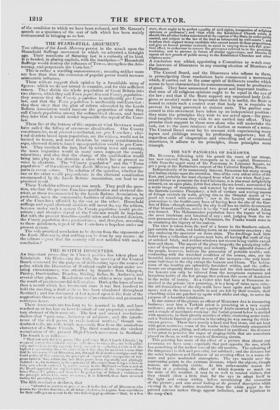THE STAND-STILL ARGUMENT.
TILE editors of the Leeds Mercury persist in the attack upon the Household Suffrage movement to which we adverted a fortnight ago. Their manifesto of Saturday last is a curiosity of its kind. It is headed, in glaring capitals, with the inscription—" Household Suffrage would destroy the influence of Towns, strengthen the Aris- tocracy, nod perpetuate the Corn-law."
This is rather a startling announcement ; meaning neither more nor less than that the extension of popular power would increase aristocratic influence.
These editors support their opinion by a formidable array of figures: which we do not intend to examine, and far this sufficient reason. They divide the whole population of Great Britain into two classes, which they call 'lawn populaion and County population : they assume that the Countll population is unalterably pro Corn- law, and that the Town population is unalterably ont Corn-law : they then show that the plan of reform advocated by the Leeds Refbrm Assoeiation would increase the proportion of what they call Cond.,/ population among the enfranchised classes, and hence they infer that it would render impossible the repeal of the Corn- law. _There lies at the bottom of this argument what Ileaarnam would have called the fallacy of erroneous classilicatims ()ur County constituencies, as at present constituted, are pro Corn-law ; eke- toral districts based upon population, say the editoes, would not be limited to towns, and must therelbre be county constituencies; ergo, electoral districts based upoo population would be pro Corn- law. They overlook the fact, that by mixing town and country, the town majorities w ould in many cases augment the county minorities; and also that the change of the qualification would bring into play in the districts a class which has at present no voice in elections. The " County population" and the " Town population " of the editors of the Leeds Mercury have no counter- parts in rerun, :adura. The solution of the question, whether the one or the other would prepomkrate its the electoral constitution recommended by the Leeds Relbrin Association, can lead to no practical result.
These Yorkshire editors prove too much. They peril the ques-
tion, whether the present hanchise-qualification and electoral dis- tricts, or those recommended by the Leeds Reform Association, be preferable, meat the comparative facilities of obtaining the repeal of the Corn-laws afforded by the one or the other. Household suffrage and eyed electoral districts will never do, say the editors, because under such a system the County population would predo- minate ; and thervi,re repeal of the Corn-law would be hopeless. But with the pr,e,ent franchise-qualifieation and electoral districts, the Countll population does predominate; and titer/Are, according to these gentlemen, repeal of the Corn-laws is hopeless under our present system. The only practical conclusion to be drawn from the arguments of the Leeds Mercury is, that nothing can he done by any means : do the editors espect that the country will rest satisfied with such a conclusion ?


























 Previous page
Previous page